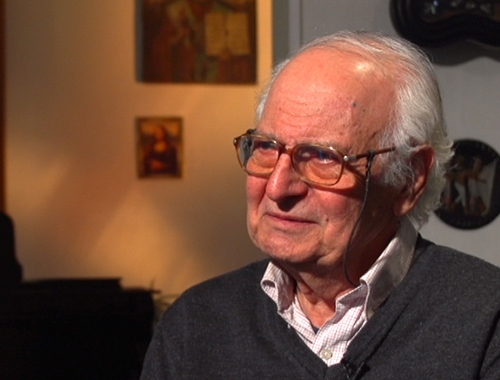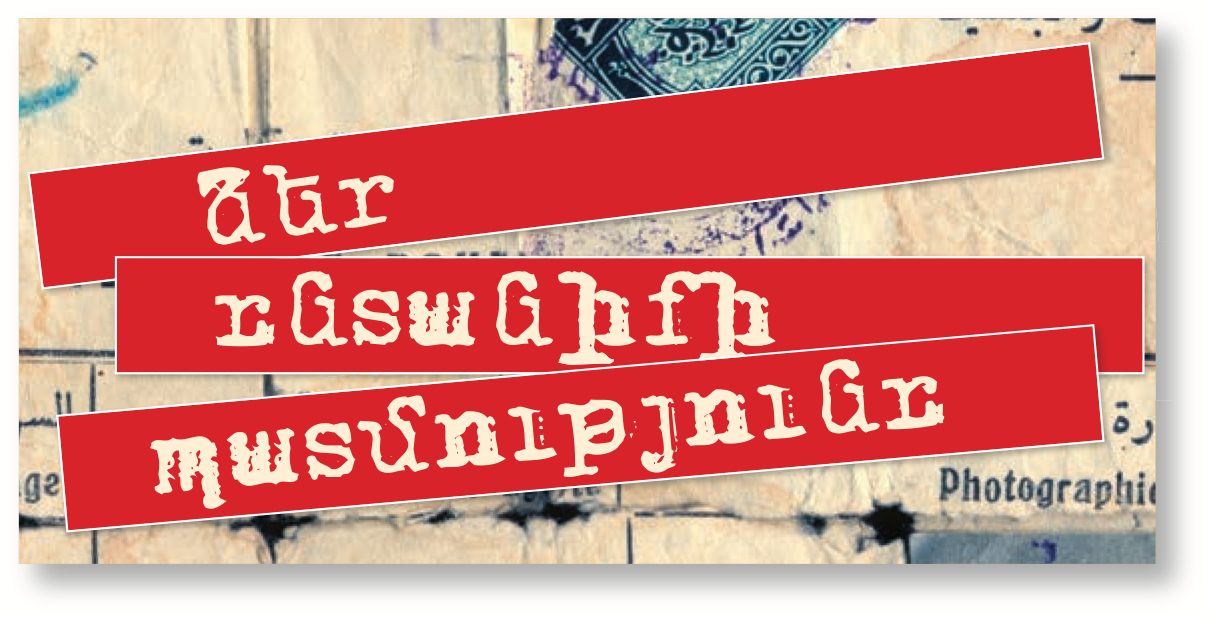 Immigrated from France in 1947
Immigrated from France in 1947
Jean V. Gureghian
My Sebastastsi father, orphaned due to the massacres, was 18 when he arrived in France. He wore a scout’s uniform, short pants, and had a small bag on his back in which there was a loaf of bread.
He spent a few days in Marseille and immediately moved to Paris. My mother came to France later. She was born in Samsun and was deported from there. The Turks killed her father. My parents met in France. There was a large publicity campaign about immigrating (to Armenia), especially by the communists. My father’s brother was a communist, and was a member of Manouchian’s group. He decided to immigrate to Armenia with the first convoy; September 1947. My father followed his older brother. They were together everywhere, starting from the deportations.
There were only two convoys from France. It wasn’t like the Syrians, who were many and had tens of convoys.
I was thirteen. One train was full of Parisians, and another full of New Yorkers. We were to board a ship in Marseille, but for some reason it was late and they took us to a special place not far from Marseille. It was a cement structure designed to hold German POWs.
Some two weeks later the ship Rossia arrived. A party onboard the ship lasted for a full day. But the ship wasn’t built to hold four thousand people. We were lucky. My father maybe paid somebody off to get a room. 90% of the people slept on the floor – in the halls, restaurants and outside.
There were hundreds of young people, aged twenty, who were brought onboard allegedly to help out. They were going to Armenia; one pair of pants and one shirt.
Four ships carrying the immigrants reached Batum together – from France, Egypt, Greece and Syria. Around 15,000 people altogether. It was a frightening mass of people.
Before disembarking, my father had a telescope and saw some suspicious things going on. He gave the telescope to others. He saw a woman, dressed as a soldier with a shouldered rifle, walking back and forth. Next to her was a child, barefoot, wearing torn, dirty clothes…
Many of the young people wanted to turn back after arriving in Batum. One group, sitting on the floor, were conducting a meeting. They decided to cross the border. They all jumped overboard into the water. Naturally, they were all caught. Luckily, they weren’t punished. A few people hid on the ship for the return trip to Europe. They were all caught and sent to Armenia. From that time on, the young people wanted to escape and cross the border.
We arrived in Armenia. We never went to the place assigned to us; a room in the basement. We went to our relatives who had immigrated in 1936.
That year, 3,000 people immigrated from France. My father was able to rent a house in Arabkir (a Yerevan neighborhood) with the money he had brought. He lived there for a year. We built our house one year later in an alley on Proshyan Street. At the time, they were assisting immigrants to buy land and build a house. We lived in one half and our uncle’s family in the other.
I started going to music school, but on the way to Armenia our piano unfortunately broke in half. I had a hard time playing it since one half didn’t work. Well, I left music school two years later and went to regular school. I later got accepted at the Polytechnic Institute and graduated with an architectural degree. Before returning to France, I mostly worked at the Armenian State Planning Institute.
I don’t know how I got involved in jazz. All the Soviet jazzmen listened to the Voice of America. There was a daily program from 11 p.m. to 1a.m. We grew up listening to it and became jazz musicians. I got a group together called Modern Jazz. They had opened a club opposite the Physical Education Institute. I even played jazz piano for a couple of months.
Those were different times. In 1949 they rounded up 50,000 people over two nights and sent them to Siberia. It was in June. The next day, families ran to one another to see who was here and who wasn’t. I had a very good friend, Armenak Ter-Abrahamyan, a local Armenian. He was a good singer and a close family friend. The next day he visited our house to see if we were still here and hadn’t been sent to Siberia. But they didn’t touch most French-Armenians. Most. I can count the number of families on my fingers, who immigrated from France that they deported. But tens of thousands of Syrians and Lebanese were.
Melineh Manouchian, who arrived one year before us, told my uncle, “Armenag, remember that the walls here have ears. Don’t talk and don’t complain.” I don’t know why they didn’t touch us. But my father didn’t sleep for years, especially when there was a truck, with its engine running, parked near our house.
The day Stalin died was very comical. We sat with Masis, my uncle’s boy, on the bench in the last row in the classroom. We were mischievous. They had, yet again, removed Masis from the class and he was in the hallway when he heard over the radio that Stalin had died. The class had ended and the door opened. It was Masis. He entered and told me in French “He’s dead”. He pointed to his moustache and we immediately understood.
The news spread and classes were suspended. Everyone started to cry. The next day our history teacher, a great guy, I believe his last name was Hakobyan, couldn’t open his mouth. He was a Vanetsi and liked the diasporan Armenians. He was so emotional that he was crying seas of tears. And all the students were crying, sincerely, except for me, Masis and two other repatriates. We made believe we were crying, as if we were sad. We hung our heads down.
There was discrimination as well. The director of a store, even the smallest of outfits, couldn’t be a repatriate. Repatriates didn’t have the right to enter the party. My uncle, who was a communist here for twenty years, and who also fought the Germans, he too didn’t have the right to join the Communist Party.
Before coming to Armenia, my father and his friends had organized a jewelers’ cooperative here (France) and purchased tools especially for Armenia. They took the equipment to Armenia and created a co-op right where the watch factory is now. A few months later, the director and my father went to Moscow and received a permit to work with gold in Armenia. It was forbidden to work with gold. It was the first time in Soviet history that they started to work with gold in Armenia. French-Armenians were the basis for the co-op.
When Pineau came to Yerevan (French Foreign Minister Christian Pineau), I didn’t go to the airport. I had an exam that day. But later, we cornered a French government secretary in the airport with a group of French-Armenians. We told the poor guy everything. Perhaps, we exaggerated as well. We made the Soviet Union into hell. When we parted, the guy was crying. Who knows what we told that man.
We then sent a letter to the French Embassy in Moscow, saying we wanted to return to France. It was three years after Stalin died. That prior fear no longer existed. We started to write petitions and renew them from that day on.
They rounded up eleven jewelers, including my father. It was alleged they were after speculators and that the KGB was involved in the case. They seized whatever my father had in the way of jewels. They raided the house. A court case was launched a few months later. Two of the eleven jewelers were sentenced to death by firing squad for speculation. Luckily, they weren’t shot. They gave two or three guys twenty-five year sentences. My father was the youngest and worked with museums. The court could prove nothing. Of course, as a jeweler, he had bought or sold something from his jewels or my mother’s, or the watches he had brought from France. He had brought a suitcase of watches from France. It wasn’t speculation, but they sentenced my father to three years.
I decided to go to the KGB and see a general there. I went with my mother. Badamyants didn’t speak a word of Armenian. He had to talk to him in Russian. He was tall, with blue eyes and yellow hair. A nice guy. Using my best Russian, I told him about my father. It was a good speech. After I was done, Badamyants said, I agree with you. I was dumbstruck. A week later they pardoned my father. He was released, but they kept what had been seized.
It was 1963 or 1964. I wrote a nice letter and sent a copy to the Soviet KGB minister and one to the Pravda newspaper. Out of the blue, the OVIR telephoned us. “What was that letter you wrote?” “Are we nothing here that you had to write to the KGB minister?” They gave us our visas a few months later. We returned to France in 1965.



















